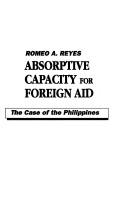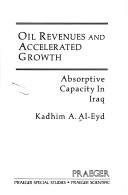| Listing 1 - 10 of 42 | << page >> |
Sort by
|
Book
Year: 1971 Publisher: Louvain : University of Louvain,
Abstract | Keywords | Export | Availability | Bookmark
 Loading...
Loading...Choose an application
- Reference Manager
- EndNote
- RefWorks (Direct export to RefWorks)
Book
Year: 2013 Publisher: Washington, DC : World Bank, Washington, DC,
Abstract | Keywords | Export | Availability | Bookmark
 Loading...
Loading...Choose an application
- Reference Manager
- EndNote
- RefWorks (Direct export to RefWorks)
Using newly collected survey data on direct supplier-multinational linkages in Chile, Ghana, Kenya, Lesotho, Mozambique, Swaziland, and Vietnam, this paper first evaluates whether foreign investors differ from domestic producers in terms of their potential to generate positive spillovers for local suppliers. It finds that foreign firms outperform domestic producers on several indicators, but have fewer linkages with the local economy and offer less supplier assistance, resulting in offsetting effects on the spillover potential. The paper also studies the relationship between foreign investor characteristics and linkages with the local economy as well as assistance extended to local suppliers. It finds that foreign investor characteristics matter for both. The paper also examines the role of suppliers' absorptive capacities in determining the intensity of their linkages with multinationals. The results indicate that several supplier characteristics matter, but these effects also depend on the length of the supplier relationship. Finally, the paper assesses whether assistance or requirements from a multinational influence spillovers on suppliers. The results confirm the existence of positive effects of assistance (including technical audits, joint product development, and technology licensing) on foreign direct investment spillovers, while the analysis finds no evidence of demand effects.
Book
Year: 2013 Publisher: Washington, DC : World Bank, Washington, DC,
Abstract | Keywords | Export | Availability | Bookmark
 Loading...
Loading...Choose an application
- Reference Manager
- EndNote
- RefWorks (Direct export to RefWorks)
Using newly collected survey data on direct supplier-multinational linkages in Chile, Ghana, Kenya, Lesotho, Mozambique, Swaziland, and Vietnam, this paper first evaluates whether foreign investors differ from domestic producers in terms of their potential to generate positive spillovers for local suppliers. It finds that foreign firms outperform domestic producers on several indicators, but have fewer linkages with the local economy and offer less supplier assistance, resulting in offsetting effects on the spillover potential. The paper also studies the relationship between foreign investor characteristics and linkages with the local economy as well as assistance extended to local suppliers. It finds that foreign investor characteristics matter for both. The paper also examines the role of suppliers' absorptive capacities in determining the intensity of their linkages with multinationals. The results indicate that several supplier characteristics matter, but these effects also depend on the length of the supplier relationship. Finally, the paper assesses whether assistance or requirements from a multinational influence spillovers on suppliers. The results confirm the existence of positive effects of assistance (including technical audits, joint product development, and technology licensing) on foreign direct investment spillovers, while the analysis finds no evidence of demand effects.
Book
Year: 2000 Publisher: Leuven : KUL. Department of applied economic sciences,
Abstract | Keywords | Export | Availability | Bookmark
 Loading...
Loading...Choose an application
- Reference Manager
- EndNote
- RefWorks (Direct export to RefWorks)
Absorptive capacity. --- Appropriability. --- Innovation. --- Technology acquisition.
Book
ISBN: 9264214852 9789264214859 Year: 1976 Volume: vol *188
Abstract | Keywords | Export | Availability | Bookmark
 Loading...
Loading...Choose an application
- Reference Manager
- EndNote
- RefWorks (Direct export to RefWorks)

ISBN: 9711280221 Year: 1993 Publisher: Makati : Philippine institute for development studies,
Abstract | Keywords | Export | Availability | Bookmark
 Loading...
Loading...Choose an application
- Reference Manager
- EndNote
- RefWorks (Direct export to RefWorks)
Absorptive capacity (Economics) --- Economic assistance --- Case studies. --- Case studies.
Book
ISBN: 9781782548577 1782548572 1782548599 9781782548591 Year: 2013 Publisher: Cheltenham, UK ; Northampton, MA, USA Edward Elgar
Abstract | Keywords | Export | Availability | Bookmark
 Loading...
Loading...Choose an application
- Reference Manager
- EndNote
- RefWorks (Direct export to RefWorks)
What does a stockbroker in Istanbul navigating the rush of incoming trading figures have in common with a mother in Stockholm trying to organize a growing pile of baby clothes? They are both coping with excess or overflow. This book explores the ways in which institutions, corporations and individuals define and manage situations of 'too much' - too much information, too many choices, too many commodities or too many tasks. By analyzing a wide range of settings - from corporate firms and public administration to everyday domestic routines - the book offers an in-depth understanding of the complexities of overflow phenomena. It questions when, where and why overflow emerges and for whom this is a problem or a blessing. This broad introduction to a striking contemporary phenomenon will prove an enlightening read for a wide-ranging audience including academics and researchers in the disciplines of business and management, political science, economic history and sociology.
Workflow --- Surplus (Economics) --- Absorptive capacity (Economics) --- Process control --- Management
Book
Year: 2002 Publisher: Washington, D.C.
Abstract | Keywords | Export | Availability | Bookmark
 Loading...
Loading...Choose an application
- Reference Manager
- EndNote
- RefWorks (Direct export to RefWorks)
Technical assistance --- Absorptive capacity (Economics) --- Evaluation. --- United States. --- Management --- Evaluation.

ISBN: 0030533066 Year: 1979 Publisher: New York (N.Y.): Praeger
Abstract | Keywords | Export | Availability | Bookmark
 Loading...
Loading...Choose an application
- Reference Manager
- EndNote
- RefWorks (Direct export to RefWorks)
Absorptive capacity (Economics) --- Petroleum industry and trade --- Finance --- Iraq --- Economic conditions.
Book
Year: 2017 Publisher: Washington, D.C. : The World Bank,
Abstract | Keywords | Export | Availability | Bookmark
 Loading...
Loading...Choose an application
- Reference Manager
- EndNote
- RefWorks (Direct export to RefWorks)
This paper evaluates the heterogeneous impact of spillovers from multinational corporations (MNCs) to domestic enterprises in the developing world. It empirically investigates two transmission channels of knowledge spillovers. First, direct contractual linkages between indigenous firms and MNCs. Second, indirect demonstration effects accrued by domestic firms by imitating foreign technologies either through observation or by hiring workers trained by MNCs. The paper focuses on the impact of spillovers on high-growth firms, which are enterprises with high job creation rates and, therefore, assumed to have high absorptive capacities. The paper also evaluates spillovers stemming from MNCs with different motivations to invest in developing countries. Employing a survey of around 71,000 firms across 50 sectors in 122 developing countries, the paper shows that high-growth firms internalize spillovers through both avenues and that contractual linkages are the most powerful transmission channel. FDI embedded in global value chains generates larger spillovers to high-growth domestic firms than investment that seeks to serve the host economy. There is no evidence that natural resource-seeking FDI generates spillovers. The results have important implications for policy design, as public funding in developing countries is often directed to support programs that seek to connect domestic suppliers with MNCs.
Absorptive Capacity --- FDI --- Firm Performance --- Foreign Direct Investment --- Global Value Chains --- Industry --- Science and Technology Development --- Spillovers --- Technology Industry --- Technology Innovation
| Listing 1 - 10 of 42 | << page >> |
Sort by
|

 Search
Search Feedback
Feedback About
About Help
Help News
News